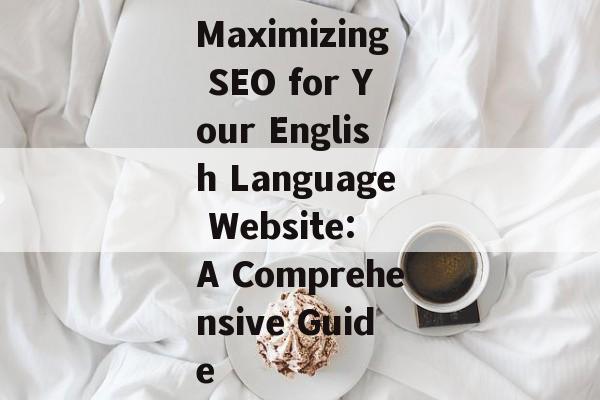Maximizing SEO for Your English Language Website: A Comprehensive Guide
Introduction:
In the vast digital landscape, where competition for online visibility is fierce, optimizing your English language website for search engines is crucial. Search Engine Optimization (SEO) is the key to driving organic traffic, improving user experience, and ultimately boosting your website's ranking on search engine results pages (SERPs). This comprehensive guide will delve into the essential strategies and best practices for optimizing your English language website for SEO.
1、Keyword Research and Optimization
The foundation of any successful SEO strategy is thorough keyword research. Begin by identifying relevant keywords that your target audience is searching for. Use tools like Google Keyword Planner, SEMrush, or Ahrefs to find long-tail keywords with high search volume and low competition. Once you have a list of keywords, integrate them strategically into your website's content, meta tags, headings, and URLs.
2、On-Page SEO
On-page SEO refers to the optimization of individual web pages to rank higher in search engine results. Here are some key on-page SEO elements to focus on:
a. Title Tags: Craft compelling and concise title tags for each page, incorporating your primary keyword. Ensure that title tags are unique for each page and reflect the content accurately.
b. Meta Descriptions: Write compelling meta descriptions that include your target keywords. This brief summary appears in SERPs and can influence click-through rates.
c. Header Tags: Use header tags (H1, H2, H3, etc.) to structure your content and make it more readable. Include keywords in your header tags, especially the H1 tag, which should be the main title of your page.
d. Content Quality: Produce high-quality, engaging, and informative content that provides value to your audience. Ensure that your content is well-structured, easy to read, and incorporates keywords naturally.
e. Internal and External Links: Include internal links to relevant pages within your website to help users navigate and to establish page authority. Additionally, acquire high-quality backlinks from reputable external websites to boost your site's credibility and ranking.
3、Technical SEO
Technical SEO involves optimizing the technical aspects of your website to improve its performance and indexing in search engines. Here are some critical technical SEO elements:
a. Mobile Optimization: Ensure your website is mobile-friendly, as a significant portion of internet traffic comes from mobile devices. Use responsive design, fast loading times, and a user-friendly mobile interface.
b. Site Speed: Optimize your website's loading speed by compressing images, leveraging browser caching, and minimizing HTTP requests. A fast-loading website provides a better user experience and is favored by search engines.
c. Secure Website: Implement HTTPS encryption to secure your website and protect user data. Google has confirmed that HTTPS is a ranking signal for search engine results.
d. Sitemap and Robots.txt: Create an XML sitemap to help search engines crawl your website efficiently. Additionally, use a robots.txt file to guide search engine crawlers and prevent them from accessing sensitive pages.
4、Local SEO
If your website targets a specific geographic area, optimizing for local SEO is essential. Here are some local SEO strategies:

a. Google My Business: Create and optimize your Google My Business listing, including accurate business information, photos, and customer reviews.
b. Local Keywords: Incorporate local keywords into your website's content, meta tags, and URLs. For example, if you run a bakery in New York City, include keywords like "New York City bakery" or "best pastries in NYC."
c. Local Citations: List your business in local directories and online business listings to improve visibility and credibility in local search results.
5、Content Marketing and Social Media
Content marketing and social media play a significant role in SEO. By creating valuable and shareable content, you can drive organic traffic, improve brand awareness, and generate backlinks. Here are some content marketing and social media strategies:
a. Blogging: Regularly publish informative and engaging blog posts that provide value to your audience. Include keywords and internal links to drive traffic to your website.
b. Infographics and Visual Content: Create visually appealing infographics, videos, and other multimedia content to engage your audience and encourage social sharing.
c. Social Media Engagement: Actively engage with your audience on social media platforms like Facebook, Twitter, LinkedIn, and Instagram. Share your content, participate in discussions, and collaborate with influencers to expand your reach.
Conclusion:
Optimizing your English language website for SEO requires a comprehensive approach that encompasses keyword research, on-page SEO, technical SEO, local SEO, and content marketing. By implementing these strategies and best practices, you can improve your website's ranking, drive organic traffic, and achieve your online business goals. Remember that SEO is an ongoing process, and staying up-to-date with the latest trends and algorithm updates is crucial for long-term success.
相关文章
